#dolichotis
Explore tagged Tumblr posts
Text
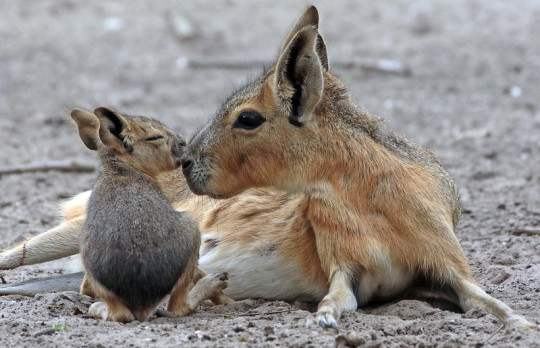
A Patagonian mara (Dolichotis patagonum) and its pup in Dierenpark Hoenderdaell, the Netherlands
by safi kok
#patagonian mara#mara#rodents#dolichotis patagonum#dolichotis#caviidae#rodentia#mammalia#chordata#captive animal#dierenpark hoenderdaell
3K notes
·
View notes
Text

Patagonian Mara (Dolichotis patagonum) - (c) SaritaWolf - please do not repost
0 notes
Text

Patagonian mara: The monogamous rodents that mate only a few times a year but pee on each other constantly
Male Patagonian maras follow females wherever they go and rub poop on the ground around them to deter rival males.
Patagonian maras (Dolichotis patagonum) are monogamous rodents that live in central and southern Argentina.
(Image credit: imageBROKER/Christopher Tamcke via Getty Images)
#imagebroker#christopher tamcke#getty images#patagonian mara#rodent#animal#mammal#wildlife#patagonia#dolichotis patagonum#argentina#nature
26 notes
·
View notes
Note
🥚 hai :3 !
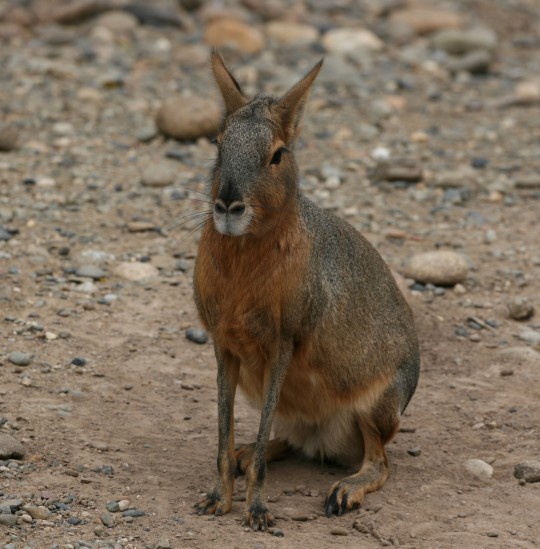
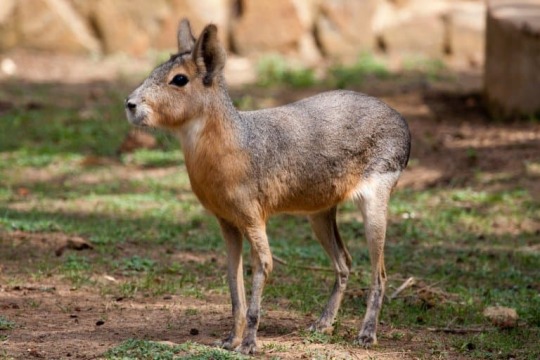
Patagonian mara!
(Dolichotis patagonum)
56 notes
·
View notes
Text




Patagonian mara (Dolichotis patagonum), family Caviidae (cavies)
Though they resemble hares or jackrabbits, they are part of the cavy family, making them rodents related to guinea pigs and capybaras (among others).
Avifauna, taken July 2024
#animals#zoo#zoo photography#nature#patagonian mara#Dolichotis patagonum#caviidae#cavies#mara#avifauna
5 notes
·
View notes
Text
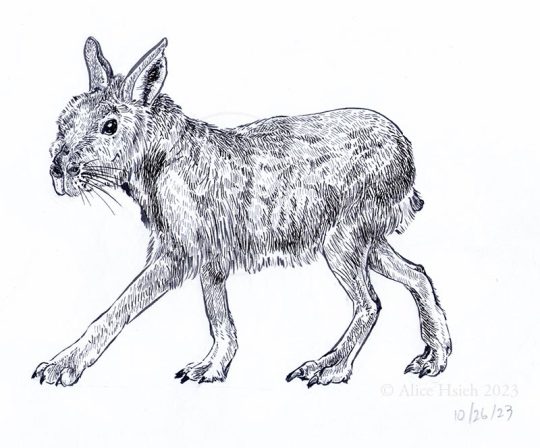
Sciartober Day 26: One of the subjects that has become a staple in my October drawings, back when I started making Halloween cards, is that there's usually a rodent somewhere. So for the prompt fast, I did the fastest rodent, the Patagonian mara, also known as the Patagonian cavy, a very rabbit-like rodent. I'm not quite sure I got the proportions right. Pentel brushpen, Windsor & Newton fine-line marker, and Prismacolor fine-line marker on Canson mixed media.
#Sciartober#Sciartober 2023#SciartoberDay26#animal#mammal#animals#rodent#Patagonian mara#Patagonian cavy#Dolichotis patagonium#fast#sciart#art#my art#October drawings#October drawings 2023#pen and ink#black and white
7 notes
·
View notes
Text

Patagonian Mara
The Patagonian mara (Dolichotis patagonum) is a relatively large rodent in the mara genus Dolichotis. It is also known as the Patagonian cavy or Patagonian hare. This herbivorous, somewhat rabbit-like animal is found in open and semiopen habitats in Argentina, including large parts of Patagonia. It is monogamous, but often breeds in warrens shared by several pairs. - Wikipedia
37 notes
·
View notes
Note

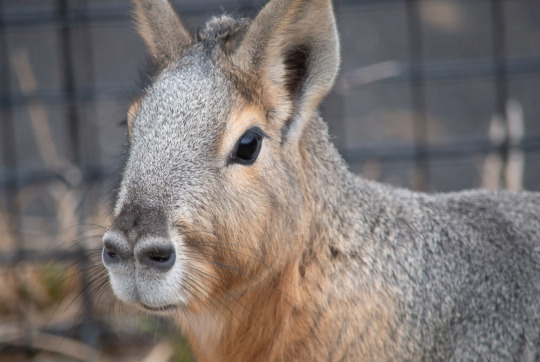

Patagonian mara
Dolichotis patagonum
Dolichotinae, Caviidae, cavimorpha, rodentia
Related to capybaras and guinea pigs
JACKSON ARE YOU INVENTING NEW ANIMALS EVERYTIME I TURN MY BACK HOW ARE YOU FINDING THESE
122 notes
·
View notes
Note
https://www.tumblr.com/birchdoodle/774677274242023424?source=share capybara deer bunny thing sounds like you talking about dream or sylvee
BFLWBFO2BGKWNFKWNFKE WELL YES. For your information that is a mara patagónica Scientific name Dolichotis patagonum 🤓 and they're so cuteeee
3 notes
·
View notes
Text

Dolichotis patagonum :3
3 notes
·
View notes
Text
Round 1.4
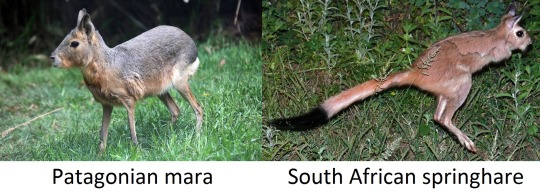
Information about contestants below!
Patagonian mara (Dolichotis patagonum)
Patagonian mara resembles a jackrabbit. It has distinctive long ears and long limbs. The feet are compressed, making them hoof-like. It’s a relatively large rodent with head and body length of 69–75 cm. Primarily diurnal. They prefer to live in habitats with shrub cover. Maras feed primarily on green vegetation and fruit. When running, they have been compared to deer and antelope.
Their social organizations have a unique combination of monogamy and communal breeding. Dens are dug during the breeding season for the young to be raised. Communal living provides protection from predators with the survival rate for young being higher in larger groups than in smaller groups.
Patagonian maras are found only in Argentina and are considered to be a near threatened species.
South African springhare (Pedetes capensis)
It’s a medium-sized terrestrial and burrowing rodent. It resembles a small kangaroo with well-developed hind legs, short front legs, and a long tail which comprises half of its body length. As well as a long tail, springhares have relatively large eyes and ears. Similar to kangaroos, they also use their tails for balance. Springhares are reported to be able to make hops of 20 cm and leaps of 2 m.
The colour of springhare varies from a reddish-brown on its upperparts to an off-white belly and a black tip on the tail. Their fur is biofluorescent.
Springhares are nocturnal animals, who forage during the night and retreat to a burrow during the day. Herbivorous, however, they are picky eaters and often leave abundant plant materials behind in their feeding grounds.
15 notes
·
View notes
Video
In this video we can see beavers (Castor canadensis) and capybaras (Hydrochoerus hydrochaeris), but I wanted to draw attention to these much less well-known guys over here:

These are Patagonian maras (Dolichotis patagonum)! Here are some clearer pictures of these animals:


Selfish rick
(via)
12K notes
·
View notes
Text

Wieder einmal feiern wir das höchste Fest des Christentums, das Osterfest. Leider ist dies für viele Menschen der Anlass, zahlreiche Tierprodukte zu kaufen, von Milchschokolade über "Ostereier" bis hin zum "Osterlamm". Dass dies alles enormes Tierleid verursacht, wird dabei ausgeblendet! 😰
Wir möchten deshalb insbesondere heute darauf hinweisen, dass Kuhmilch ausschließlich für Kälber und nicht für Menschen gedacht ist - und das gilt auch für Käse, Sahne, Milchschokolade usw.! Für uns gibt es hingegen Hafermilch, Sojajoghurt und veganen Käse! 😎🌱
Warum also konsumieren so viele Menschen noch immer Kuhmilchprodukte? Würden sie genau gerne Hasenmilchprodukte kaufen? Oder doch lieber auf Giraffenmilch zurückgreifen? Wir wissen es nicht... 😉
Und was ist mit Hühnereiern? Wer bitte denkt ernsthaft, dass der menschliche Körper von der Natur dafür vorgesehen wurde, Vogeleier zu essen?! Auch wenn wir nahezu alles essen können, wenn es nur ausreichend gegart wurde, heißt das doch nicht, dass dies auch sinnvoll ist, oder?
Wir bitten Euch deshalb, vergesst an Ostern die anderen Tiere nicht und boykottiert sämtliche Tierprodukte - für die Tiere, den Planeten und Eure eigene Gesundheit! 💚
In diesem Sinne wünschen wir Euch allen ein frohes veganes Osterfest! 😊🌱
Anmerkung: Auf dem Bild seht Ihr einen großen Pampashasen, auch bekannt als Große Mara (Dolichotis patagonum). Er ist eine in Argentinien lebende Nagetierart aus der Familie der Meerschweinchen (Caviidae).
Quellen: ➡ LINK 1 ➡ LINK 2 ➡ LINK 3 ➡ LINK 4 ➡ LINK 5
0 notes
Text
Mara della Patagonia: i roditori monogami che si accoppiano solo poche volte all'anno ma si fanno la pipì addosso costantemente Il Fascino della Mara della Patagonia La Mara della Patagonia (Dolichotis patagonus) è un roditore monogamo che vive nelle praterie aride e nei terreni arbusti dell’Argentina centrale e meridionale. Questi animali si nutrono di erbe, cactus, semi, frutti, fiori e persino del proprio sterco. Una Vita di Accoppiamento I mara della Patagonia formano legami monogami per tutta la vita. I maschi sono estremamente protettivi nei confronti delle loro compagne, mantenendo un forte legame di difesa reciproca. Pur mantenendo un contatto fisico limitato, durante l’accoppiamento i maschi mostrano comportamenti peculiarmente sociali. Comportamenti Insoliti Uno studio del 1974 ha rivelato che i
0 notes
Text




Patagonian mara (Dolichotis patagonum) (juvenile), family Caviidae (cavies)
Young maras are raised inside dens dug during the breeding season. For the first three weeks of their life, they remain near it. Afterwards, they can leave the den to graze with their parents.
Dierenpark Zie-ZOO, taken August 2024
Previous post (with the adults) can be found here.
#animals#zoo#zoo photography#nature#Patagonian mara#Dolichotis patagonum#caviidae#cavies#mara#dierenpark zie-zoo#just got jumpscared copying the link to the other post because apparently the text in the link is from the original draft#and for a brief moment I worried I never actually corrected its name. man.
1 note
·
View note
Text
Cynomys ludovicianus. Black tailed prairie dog.
Callosciurus prevostii. Prevost’s squirrel.
Sciurus aberti aberti. Piebald abert’s squirrel.
Cryptoprocta ferox. Fossa.
Dolichotis patagonium. Patagonian mara.
Procavia capensis. Rock hyrax.
Galidia elegans. Ring-tailed vontsira.
Madoqua kirkii. Kirk’s dikdik.










33 notes
·
View notes